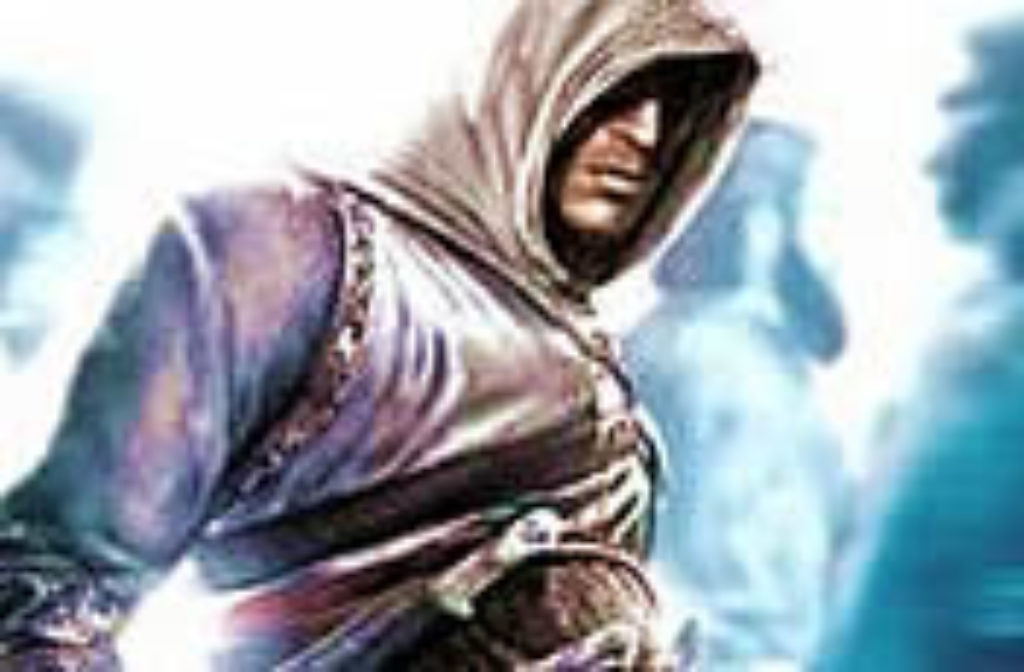
What would you think if science could pull some genetic tidbit out of your DNA and give you the power to relive past memories? I’m not just talking about your own memories, either. How about your grandmother’s or your great-great-great-great-grandfather’s? Wouldn’t it be cool to learn new things about an ancient relative and be there for his or her most important choices?
But what if you found out that he was a killer? That’s the essence of Assassin’s Creed, Ubisoft’s action/adventure video game which landed on many critics’ Top 10 lists for 2007. (The game was originally released for PlayStation 3 and Xbox 360; now it’s been released in a PC version.)
Players fill the role of an average-Joe bartender named Desmond Miles who’s snatched off the street by strangers and forcibly strapped into a machine called the Animus. Before he can even voice a protest, the hapless Desmond has his genetic code pillaged. He trades his khakis and Hawaiian shirt for the sword and hooded cloak of his ancestor, Altair, a member of a brotherhood of assassins extraordinaire living in the Crusades-era Middle East. Desmond’s sinister captors compel him to relive the actions of his stealthy forbearer as he assassinates public figures of the day.
Between deadly assignments in the past, we learn that Desmond’s capture and coerced participation is part of an intricate intrigue that swirls around the Holy Land and involves the Knights Templar and King Richard the Lionhearted. But as twisting and turning as the narrative is, the game’s real focus is straightforward: Players need to find an ancient artifact called the “Piece of Eden” and figure out ways to surreptitiously kill anyone who stands in the way. I guess you could say, then, that the game plays like a 12th-century version of Hitman.
Death From the Shadows
This hit man doesn’t have guns and bombs to get the job done. But there are certainly plenty of hiding places in this unique world that one can slip in and out of with a razor-sharp blade in tow. Players have three major cities to explore. Each is detailed and beautifully rendered, featuring lofty towers with sweeping views, bustling market squares and milling crowds of well-defined citizenry. Climbing up the sides of buildings and capering along the rooftops of these exquisitely realistic locales—while secretly tracking guards, eavesdropping on people or strategically choosing points of cover in the street below—makes for entertaining gameplay.
But for all of Assassin’s Creed‘s leaping, tumbling and slinky shadow-hiding, it’s the kill that is paramount. Assassination assignments supposedly target evil men who have committed heinous deeds. The brotherhood of assassins states that it is merely trying to bring peace to the region by eliminating these fiends. But by the end of the story, wickedness or goodness (even in Altair’s case) is up for grabs. In fact, Altair repeatedly reminds us that, “Nothing is true. Everything is permitted.”
In that spirit, nine prime subjects (and potentially hundreds of others) fall by Altair’s virtual hand. And there are no hard-and-fast means by which you must complete these murderous objectives. For instance, with cunning and strategy you can dispatch your prey from a distance with throwing blades, or jump from above and plunge a hidden knife into a victim’s neck. You can also risk detection by charging in with sword drawn for the bloodiest kill, impaling and slashing. (Blood is displayed as a red mist that spurts with the killing blow and can spatter on clothing or tint water.)
The Spirit of Things
Assassin’s Creed attempts to stay neutral on the Christian-Islamic conflicts that fueled the Crusades. At most, political orators on the street can be heard to say such things as, “What are they crusading for? This is our land!” Late in the story a reference to Revelation 22:13—”I am the Alpha and Omega”—is written on a wall.
The game, however, shows its true colors when attributing special powers to the Piece of Eden artifact that everyone is pursuing. While never connected directly to the Garden of Eden, the relic is magically able to alter what men see in a sort of mass hypnosis. Altair’s master, the Assassin king, says that it has been the source of all biblical miracles. In other words, the Red Sea didn’t part, Moses’ cleft rock didn’t really produce water, Jesus didn’t turn water to wine—they were all illusions created by the artifact.
In addition to that attempt at diminishing God’s miraculous power, the game blasphemes His name by combining it with “d–n.” Other profanities show up too, including a few f- and s-words, “b–tard,” “a–” and “h—.”
Granddad Was a What?
It’s too bad that the game’s makers decided to steer it in the direction that they did. The combination of revisionist spiritualism, crude language and replayed memories of ancestral murder more than mar the hours of creative gameplay that Asssassin’s Creed has to offer.
OK, I’ll admit that playing through the memories of a “representative” ancestor who was a fishmonger or a stable cleaner wouldn’t be as exciting as the stealth and acrobatics of this game’s current focus, and probably wouldn’t end up on anyone’s list of Top 10 fun. But let’s face it, slipping out of the digital shadows and driving a hidden blade between the third and fourth vertebrae of a victim’s virtual backbone really shouldn’t be on that list either.

After spending more than two decades touring, directing, writing and producing for Christian theater and radio (most recently for Adventures in Odyssey, which he still contributes to), Bob joined the Plugged In staff to help us focus more heavily on video games. He is also one of our primary movie reviewers.